The Telecom Testing Equipment Market is estimated to be valued at USD 4.8 billion in 2025 and is projected to reach USD 9.7 billion by 2035, registering a compound annual growth rate (CAGR) of 7.2% over the forecast period.
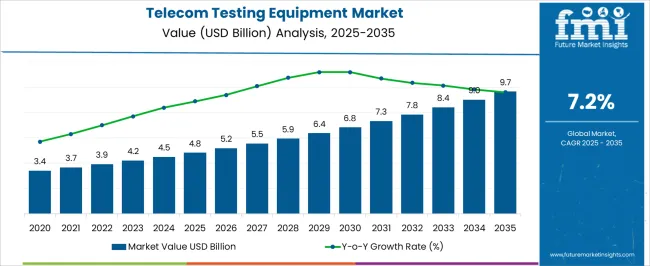
| Metric | Value |
|---|---|
| Telecom Testing Equipment Market Estimated Value in (2025 E) | USD 4.8 billion |
| Telecom Testing Equipment Market Forecast Value in (2035 F) | USD 9.7 billion |
| Forecast CAGR (2025 to 2035) | 7.2% |
The Telecom Testing Equipment market is experiencing steady growth driven by the accelerating expansion of global telecommunication networks and the increasing complexity of network technologies. The market is being shaped by the growing deployment of 5G, fiber optic networks, and software-defined networking, which require precise and reliable testing solutions to ensure optimal performance and compliance with industry standards.
Investment in network infrastructure by service providers and enterprises is creating a strong demand for testing solutions that can validate equipment functionality, network performance, and service quality. Additionally, the shift toward automation and remote monitoring is driving the adoption of integrated testing platforms that combine hardware and software capabilities.
Rising needs for minimizing downtime, enhancing network reliability, and ensuring faster rollouts of advanced telecom services are further contributing to market growth As network operators focus on scaling capacity and improving service quality, the Telecom Testing Equipment market is expected to continue its upward trajectory, with opportunities emerging in both established and emerging regions worldwide.
The telecom testing equipment market is segmented by product, service, end use, and geographic regions. By product, telecom testing equipment market is divided into General Purpose Test Equipment (GPTE) and Mechanical Test Equipment (MTE). In terms of service, telecom testing equipment market is classified into Product Support Services, Managed Services, and Professional Services. Based on end use, telecom testing equipment market is segmented into Network Equipment Manufacturers (NEMS), Telecommunication Service Providers, and Mobile Device Manufacturers. Regionally, the telecom testing equipment industry is classified into North America, Latin America, Western Europe, Eastern Europe, Balkan & Baltic Countries, Russia & Belarus, Central Asia, East Asia, South Asia & Pacific, and the Middle East & Africa.
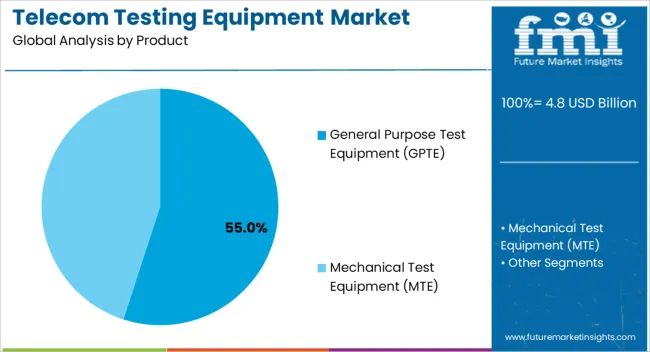
The General Purpose Test Equipment segment is projected to account for 55% of the Telecom Testing Equipment market revenue in 2025, establishing it as the leading product category. This dominance is being attributed to its versatility, which allows multiple testing functions to be performed on diverse telecommunication devices and systems. Adoption has been accelerated by the widespread need for cost-effective and reliable equipment capable of testing both legacy and next-generation network components.
These solutions are preferred because they can support multiple testing protocols, reducing the need for specialized devices and enabling faster deployment cycles. The ability to adapt to emerging technologies through software updates has further enhanced the appeal of general purpose test equipment.
Enterprises and network operators benefit from reduced operational complexity and improved efficiency when using these solutions across various network scenarios The segment’s growth is also supported by increased demand for rigorous quality assurance in high-speed networks and the proliferation of advanced mobile and broadband services requiring accurate testing to maintain performance standards.
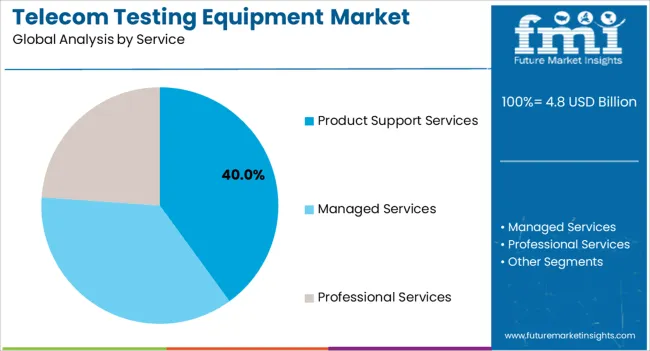
The Product Support Services segment is expected to hold 40% of the market revenue in 2025, positioning it as a critical component of the Telecom Testing Equipment market. The growth of this segment has been driven by the increasing reliance of telecom operators and equipment manufacturers on outsourced services for installation, calibration, maintenance, and troubleshooting of testing solutions. Services are valued because they extend the life of equipment, ensure compliance with performance standards, and reduce operational risks associated with network failures.
Additionally, support services enable rapid adaptation to evolving network technologies and protocols, particularly in complex environments such as 5G and fiber optics. Organizations are leveraging these services to enhance operational efficiency, reduce downtime, and maintain high levels of service quality.
The segment’s expansion is further facilitated by the growing complexity of testing requirements and the need for technical expertise, which makes in-house management less practical for many operators As telecom networks continue to scale and modernize, the demand for comprehensive product support services is anticipated to remain strong.
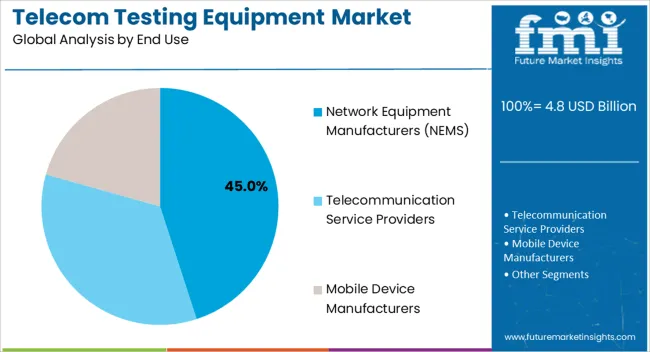
The Network Equipment Manufacturers segment is projected to account for 45% of the Telecom Testing Equipment market revenue in 2025, making it the largest end-use segment. This leadership is being attributed to the heavy reliance of equipment manufacturers on testing solutions to ensure that their products meet stringent performance and compliance standards before deployment.
Growth in this segment is being driven by increasing demand for next-generation network equipment, including 5G base stations, routers, switches, and optical transmission systems, which require rigorous testing to guarantee reliability and interoperability. Manufacturers benefit from testing solutions that provide precise diagnostics, real-time monitoring, and comprehensive validation of network functionality, reducing the risk of post-deployment failures.
The segment has also gained momentum due to heightened quality assurance requirements, accelerated product development cycles, and the need to maintain competitive advantage in a rapidly evolving telecom landscape With the ongoing expansion of global communication infrastructure and rising technological complexity, Network Equipment Manufacturers are expected to continue representing a significant portion of the market, leveraging advanced testing equipment to enhance product quality and operational efficiency.
Telecom is a short name for telecommunications, where context allows media or people to commonly exclude the rest of its name without confusion, often resulting from a monopoly or previous monopoly. The term is now trademarked by various companies in their local jurisdiction, although usually with a qualifier of locality (e.g. 'Deutsche' Telekom), since 1985. In some countries, (e.g. New Zealand) the word TELECOM on its own is a registered trade mark.
The telecom service providers have transformed their legacy network into an advanced multimedia service network. Organization of advanced network elements gives a variety of configurations and value added services, due to this complex and advanced network elements, a telecom testing equipment is required for service oriented network in terms of end user experience, service quality, and interoperability.
The telecom industry widely uses telecom testing equipment for automated/load testing, conformance testing, remote accessibility, fault testing & analysis, customized testing, and centralized web-based control & analysis. Further, in the telecom industry, significant investment of capital is required for infrastructure development. Telecom testing equipment accounts for a considerable share of the invested capital.
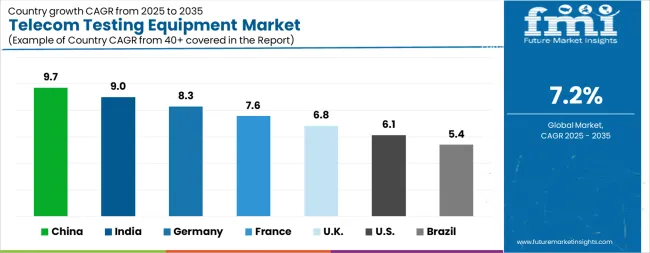
| Country | CAGR |
|---|---|
| China | 9.7% |
| India | 9.0% |
| Germany | 8.3% |
| France | 7.6% |
| UK | 6.8% |
| USA | 6.1% |
| Brazil | 5.4% |
The Telecom Testing Equipment Market is expected to register a CAGR of 7.2% during the forecast period, exhibiting varied country level momentum. China leads with the highest CAGR of 9.7%, followed by India at 9.0%. Developed markets such as Germany, France, and the UK continue to expand steadily, while the USA is likely to grow at consistent rates. Brazil posts the lowest CAGR at 5.4%, yet still underscores a broadly positive trajectory for the global Telecom Testing Equipment Market. In 2024, Germany held a dominant revenue in the Western Europe market and is expected to grow with a CAGR of 8.3%. The USA Telecom Testing Equipment Market is estimated to be valued at USD 1.8 billion in 2025 and is anticipated to reach a valuation of USD 3.2 billion by 2035. Sales are projected to rise at a CAGR of 6.1% over the forecast period between 2025 and 2035. While Japan and South Korea markets are estimated to be valued at USD 240.3 million and USD 150.5 million respectively in 2025.
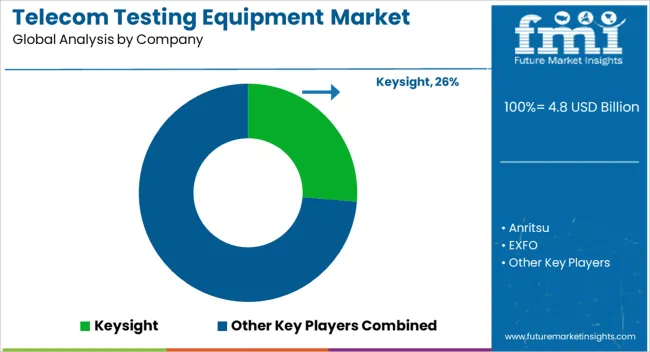
| Item | Value |
|---|---|
| Quantitative Units | USD 4.8 Billion |
| Product | General Purpose Test Equipment (GPTE) and Mechanical Test Equipment (MTE) |
| Service | Product Support Services, Managed Services, and Professional Services |
| End Use | Network Equipment Manufacturers (NEMS), Telecommunication Service Providers, and Mobile Device Manufacturers |
| Regions Covered | North America, Europe, Asia-Pacific, Latin America, Middle East & Africa |
| Country Covered | United States, Canada, Germany, France, United Kingdom, China, Japan, India, Brazil, South Africa |
| Key Companies Profiled | Keysight, Anritsu, EXFO, Yokogawa Electric, Viavi Solutions, Tessco, Mortek, and Spirent Communications |
The global telecom testing equipment market is estimated to be valued at USD 4.8 billion in 2025.
The market size for the telecom testing equipment market is projected to reach USD 9.7 billion by 2035.
The telecom testing equipment market is expected to grow at a 7.2% CAGR between 2025 and 2035.
The key product types in telecom testing equipment market are general purpose test equipment (gpte) and mechanical test equipment (mte).
In terms of service, product support services segment to command 40.0% share in the telecom testing equipment market in 2025.






Our Research Products

The "Full Research Suite" delivers actionable market intel, deep dives on markets or technologies, so clients act faster, cut risk, and unlock growth.

The Leaderboard benchmarks and ranks top vendors, classifying them as Established Leaders, Leading Challengers, or Disruptors & Challengers.

Locates where complements amplify value and substitutes erode it, forecasting net impact by horizon

We deliver granular, decision-grade intel: market sizing, 5-year forecasts, pricing, adoption, usage, revenue, and operational KPIs—plus competitor tracking, regulation, and value chains—across 60 countries broadly.

Spot the shifts before they hit your P&L. We track inflection points, adoption curves, pricing moves, and ecosystem plays to show where demand is heading, why it is changing, and what to do next across high-growth markets and disruptive tech

Real-time reads of user behavior. We track shifting priorities, perceptions of today’s and next-gen services, and provider experience, then pace how fast tech moves from trial to adoption, blending buyer, consumer, and channel inputs with social signals (#WhySwitch, #UX).

Partner with our analyst team to build a custom report designed around your business priorities. From analysing market trends to assessing competitors or crafting bespoke datasets, we tailor insights to your needs.
Supplier Intelligence
Discovery & Profiling
Capacity & Footprint
Performance & Risk
Compliance & Governance
Commercial Readiness
Who Supplies Whom
Scorecards & Shortlists
Playbooks & Docs
Category Intelligence
Definition & Scope
Demand & Use Cases
Cost Drivers
Market Structure
Supply Chain Map
Trade & Policy
Operating Norms
Deliverables
Buyer Intelligence
Account Basics
Spend & Scope
Procurement Model
Vendor Requirements
Terms & Policies
Entry Strategy
Pain Points & Triggers
Outputs
Pricing Analysis
Benchmarks
Trends
Should-Cost
Indexation
Landed Cost
Commercial Terms
Deliverables
Brand Analysis
Positioning & Value Prop
Share & Presence
Customer Evidence
Go-to-Market
Digital & Reputation
Compliance & Trust
KPIs & Gaps
Outputs
Full Research Suite comprises of:
Market outlook & trends analysis
Interviews & case studies
Strategic recommendations
Vendor profiles & capabilities analysis
5-year forecasts
8 regions and 60+ country-level data splits
Market segment data splits
12 months of continuous data updates
DELIVERED AS:
PDF EXCEL ONLINE
Telecom Equipment Market Size and Share Forecast Outlook 2025 to 2035
5G Testing Equipment Market Analysis - Size, Growth, and Forecast 2025 to 2035
Eye Testing Equipment Market Size and Share Forecast Outlook 2025 to 2035
IoT Testing Equipment Market Size and Share Forecast Outlook 2025 to 2035
LTE Testing Equipment Market Growth – Trends & Forecast 2019-2027
Sand Testing Equipments Market Size and Share Forecast Outlook 2025 to 2035
Drug Testing Equipment Market
Steel Testing Equipment Market Size and Share Forecast Outlook 2025 to 2035
Metal Testing Equipment Market Size and Share Forecast Outlook 2025 to 2035
Glass Testing Equipment Market Size and Share Forecast Outlook 2025 to 2035
Shear Testing Equipment Market Size and Share Forecast Outlook 2025 to 2035
Blood Testing Equipment Market Growth - Trends & Forecast 2025 to 2035
Motor Testing Equipment Market - Growth & Demand 2025 to 2035
Mortar Testing Equipment Market Size and Share Forecast Outlook 2025 to 2035
Fabric Testing Equipment Market Size and Share Forecast Outlook 2025 to 2035
Rubber Testing Equipment Market Growth – Trends & Forecast 2025 to 2035
Asphalt Testing Equipment Market Size and Share Forecast Outlook 2025 to 2035
Bitumen Testing Equipment Market Size and Share Forecast Outlook 2025 to 2035
Battery Testing Equipment Market Growth – Trends & Forecast 2025 to 2035
Polymer Testing Equipment Market Growth – Trends & Forecast 2019-2027

Thank you!
You will receive an email from our Business Development Manager. Please be sure to check your SPAM/JUNK folder too.
Chat With
MaRIA